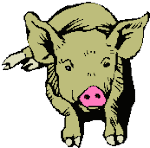.
"Our results indicate that livestock represents a relevant reservoir for the import of MRSA into regional German hospitals."
That seems to settle that.
MRSA in pigs and other livestock is a risk to our hospitals.
Britain now has to admit that British pigs do have MRSA and that they have been holding back the bad news.
The NHS has to introduce proper targeted screening and vets have to be banned from prescribing antibiotics, as the Dutch are suggesting.
Then there will be time for a full public enquiry with evidence to be given under oath of exactly has been going on in Defra, Britain's agriculture ministry, for the past ten years and to establish the true origins of the PMWS-MRSA1999, CSF2000 and FMD2000 epidemics.
New Zealand and Australia need to start investigating their situation
In Canada and the USA, things are easier. You already know your pigs have MRSA and this is carried in pork. You now have to protect your hospitals by following the sucessful Dutch screening techniques.
http://www.ncbi.nlm.nih.gov/pubmed/19701815?dopt=Abstract
Eur J Clin Microbiol Infect Dis. 2009 Aug 25. [Epub ahead of print]Related Articles, Links Prevalence and molecular characteristics of methicillin-resistant Staphylococcus aureus (MRSA) among pigs on German farms and import oflivestock-related MRSA into hospitals.
Köck R, Harlizius J, Bressan N, Laerberg R, Wieler LH, Witte W,Deurenberg RH, Voss A, Becker K, Friedrich AW.
Institute of Hygiene, University Hospital Münster, Robert-Koch-Str.41, 48149, Münster, Germany.
The aim of this study was to evaluate the prevalence and molecular characteristics of methicillin-resistant Staphylococcus aureus (MRSA)among pigs and estimate the impact of this animal reservoir on human healthcare.
Nasal swabs were derived from 1,600 pigs at 40 German farms. The MRSA were characterized using S. aureus protein A (spa)typing, multilocus sequence typing (MLST) and detection of toxin genes.
In a retrospective case control study, we compared risk factors for the carriage of MRSA between patients carrying spa types found among regional pigs and patients with other MRSA molecular types. Pigs carrying MRSA were identified on 70% of the farms (spa types t011,t034, t108, t1451 and t2510, all associated with MLST sequence type ST398). Contact to pigs and cattle were independent risk factors for the carriage of these spa types in patients at hospital admission.
Our results indicate that livestock represents a relevant reservoir for the import of MRSA into regional German hospitals.
PMID: 19701815 [PubMed - as supplied by publisher]
